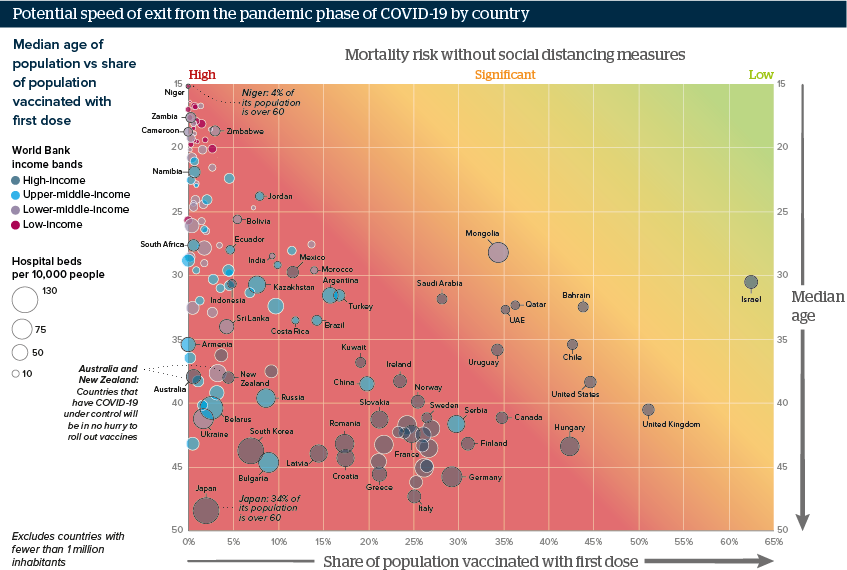‘Finishing line’ of pandemic will vary by country
With Israel showing what life is like after widespread vaccination against COVID-19, the question is who will be next
Source: World Bank, World Health Organization, Our World in Data, UN World Population Prospects 2019, PopulationPyramid
Outlook
The most influential factor in COVID-19 mortality is age. Once the majority of the vulnerable populations, including those over the ages of 50-60, are immunised, hospitalisations and deaths plummet. This allows the relaxation of strict social distancing measures. The speed with which countries reach this point will vary, depending on the number of older and vulnerable people each country has, its healthcare capacity, ability to access vaccines, how fast it rolls them out and whom it prioritises for them.
Developed countries can complete vaccine campaigns faster than developing ones, even if they have larger older populations. Even slow starters like Japan could advance rapidly once roll-outs gather pace.
Impacts
- Even if countries vaccinate all their vulnerable and older cohorts, they will probably still see localised COVID-19 outbreaks.
- Countries with low health sector capacity would need to vaccinate a higher proportion of individuals.
- If COVID-19 variants lower the effectiveness of vaccines, they could derail current trajectories.
- COVID-19 looks set to become endemic in many countries, raising the chances that consequential new variants will arise.
- Endemicity in certain countries would mean travel restrictions stay in place for some time.
See also
- Prospects for COVID-19 in 2022 - Nov 24, 2021
- COVID case link to distancing measures will end soon - Aug 24, 2021
- Unvaccinated will bear the brunt of COVID-19 - Jul 22, 2021
- Building African vaccine capacity will take time - Jul 8, 2021
- Vaccines will be slow to reach the Sahel’s rural areas - Jul 5, 2021
- Organised crime will gain from world vaccine shortages - Jun 22, 2021
- Prospects for COVID-19 to end-2021 - Jun 16, 2021
- Delta variant will fuel faster COVID waves globally - Jun 10, 2021
- Seychelles COVID outbreak may answer vaccine questions - May 13, 2021
- Vaccine passports will come before global standards - Apr 16, 2021
- Variants may delay, not derail COVID-19 control - Feb 15, 2021
- Prospects for COVID-19 in 2021 - Nov 19, 2020
- More graphic analysis
